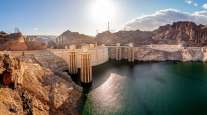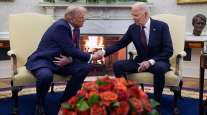Staff Reporter
Experts Say Washington Needs to Treat Infrastructure Funding as 'Exigent Crisis'

[Stay on top of transportation news: Get TTNews in your inbox.]
There is ample room for creativity in developing solutions to fix the nation’s transportation infrastructure, but elected officials must overcome their differences and work together if they hope to succeed, experts said.
“This is an issue that tends to unite even a polarized Congress,” said Phil English, a Republican who formerly represented Pennsylvania in the U.S. House of Representatives and now serves as a senior government relations adviser for the law firm Arent Fox. During a June 3 webinar hosted by the firm called “Responding to America’s Infrastructure Crisis,” English described infrastructure as an area in which bipartisanship can thrive.
“The needs of communities for the transportation of goods and individuals, as well as clean water, is absolutely critical,” he said.

English
Rep. Eleanor Holmes Norton (D-D.C.), who serves as chairman of the Highways and Transit Subcommittee in the House of Representatives, said her priority is to craft legislation that is sensitive to the modernization of transportation and takes into account technology, construction materials and modes of travel. She said transportation and infrastructure should be re-envisioned to include scooters and ride-sharing services that have grown more prevalent in recent years.
“If we build roads in the way we have been building them, we will have to rebuild them much sooner,” Holmes Norton said. “We gave little or no thought to alternative modes of transportation which are demanding to share the roads that were built with none of them in mind.”
The webinar occurred about a month after President Donald Trump held a meeting with congressional Democrats that resulted in an agreement for a $2 trillion infrastructure deal. Leaders never determined fundraising details and the plan has since stalled.
The nation earned a D+ on the American Society of Civil Engineers’ infrastructure report card, issued in 2017. Emily Feenstra, director of infrastructure initiatives for ASCE, said this score reflects the backlog of needs facing the country. She said America faces a $2 trillion funding gap for infrastructure needs. Failing to determine an infrastructure funding solution will result in a $3.9 trillion cost to the economy by 2025, according to ASCE.
Dan Renberg, co-leader of Arent Fox’s government relations practice, said Congress and the president should respond to national infrastructure needs as a crisis. He described infrastructure shortfalls as a “silent killer.” He mentioned that public attention rarely lingers on infrastructure because disasters, such as bridge collapses, are episodic calamities rather than frequent incidents.
“We need for Congress and the executive branch to respond to this as if it were the kind of exigent crisis they are known to respond to,” Renberg said.
Renberg said a gradual fuel tax increase, such as one that proposes hiking the rate by a penny a month, could gain traction with Americans. The federal fuel tax rate has stagnated at 24.4 cents a gallon for diesel and 18.4 cents a gallon for gasoline since 1993.

Renberg
Judy Feder, a professor of public policy at Georgetown University, expressed skepticism that a federal infrastructure package will materialize. She said a successful plan is dependent upon the president and Congress jumping off “the risky bridge together” and forming a solution to raise revenue, such as a fuel tax increase. Feder said such teamwork is doubtful, as the president is likely to criticize his own team members if they come forward with a proposal.
“You’d think it would be simple because there’d be so many winners,” Feder said. “Everybody needs a bridge, a school.”




